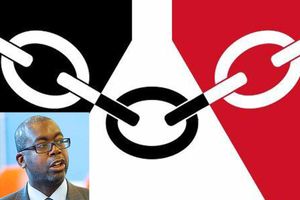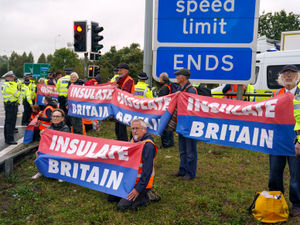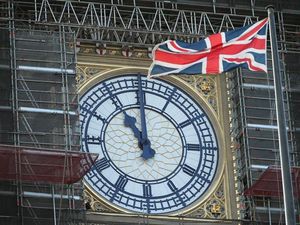Black Country flag 'offensive and insensitive' says leading racism campaigner
The Black Country flag is offensive, says a leading racism campaigner who complains that chains made in the area were used to shackle slaves.

Political activist Patrick Vernon OBE described the flag as 'offensive and insensitive' and said its chains were a 'disturbing' image of an industry that profited from the transatlantic slave trade and colonial rule in Africa.
His comments - today dismissed as 'political correctness garbage' - came as thousands of people celebrated the region's history over the weekend in The Black Country Festival and Cradley Heath's Women's Chainmakers' Festival.
Annual Black Country Day celebrations take place tomorrow.
Mr Vernon, who grew up in All Saints, Wolverhampton, and is a former London Labour councillor, said the Black Country had shied away from addressing the role its industries played in slavery and that community leaders were trying to 'pretend it never happened'. "The chain being used as a symbol in the flag is insensitive," he said. "Shackles and manacles that were made by chainmakers in the Black Country were used to incarcerate slaves in North America, on plantations and in colonial Africa.
He has worked tirelessly to improve community relations and sits on a number of prestigious committees.
His work with charity groups played a huge part in him being awarded the OBE. Therefore, he has our utmost respect and admiration.
He is also clearly well-intentioned.
However, regarding his comments about the Black Country flag... he is clearly talking out of his hat.
And that's putting it politely.
A former councillor in Hackney, Wolverhampton-born Mr Vernon, a political commentator and sometime contributor to black newspaper The Voice believes the flag is 'insensitive' and 'offensive'.
He says: "Shackles and manacles that were made by chainmakers in the Black Country were used to incarcerate slaves in North America, on plantations and in colonial Africa. There needs to be a re-interpretation."
No there does not.
The flag itself was designed by a 12-year-old schoolgirl, linking together our region's proud glass-making heritage as well as its heavy industry and foundries, illustrated by the chains.
The colours signify the 'black by day, red by night' nature of our town's during the industrial revolution.
The flag has been adopted by hundreds of thousands of people as a proud symbol of this area, popping up all over the world at football matches, cricket tests and even the Glastonbury Festival. One of the many great things about the Black Country is that it is a beacon for integration, racial and religious tolerance that we believe is unmatched anywhere in Britain.
Community leaders of all colours and creeds have backed the brilliant design and helped spread the word about the brilliance of the Black Country far and wide. Tomorrow we celebrate Black Country Day on the anniversary of the the invention of the world's first successful steam engine, the Newcomen, built in Dudley (some say Wolverhampton) in 1712.
Mr Vernon says his comments are 'not political correctness'.
We beg to differ.
The flag is a symbol of pride in our region and its industrial heritage – but also one of multi-cultural integration so natural that people round here don't really feel the need to talk about it.
"The chain is not a swastika or a Confederate flag but it is offensive. While I am in support of the festival and think it is a great idea, the Black Country has never done anything to acknowledge that slavery was key to its economic rise. This is not political correctness, it is the truth. You can't pick and choose bits of your history, they are interlinked. There needs to be a re-interpretation and leaders cannot pretend it never happened.
"It was not just the slaves who were oppressed by chainmaking, there was the women – the white slaves of Cradley Heath – and the working classes who were oppressed by the rich foundry owners. The chain is a symbol of their oppression too."
The flag was designed two years ago by schoolgirl Gracie Sheppard, now aged 14, who attends Redhill Secondary School in Stourbridge, in a competition by the Black Country Living Museum. The chains represent its chainmaking and industrial heritage while the red, and black colours on the flag are a reference to the description of the Black Country by Elihu Burritt, who said it was 'black by day and red by night'. The white cone shape represents the area's glassmaking industry.
Thousands of flags have been sold since its launch and have been spotted at England football matches, Glastonbury Festival and at the former British Armed Force's base in Afghanistan, Camp Bastion.
Mr Vernon's comments have caused outrage among MPs and top councillors on the eve of Black Country Day tomorrow.
Dudley North Labour MP Ian Austin said: "This is ridiculous nonsense. The Black Country Festival brings everyone from our diverse communities together. If he had come to Stone Street Square this weekend he would have seen people off all races and backgrounds enjoying the fun. It was an example of what makes our society something to celebrate."
Dudley South Conservative MP Mike Wood added: "While we need to be sensitive, we should not be trying to re-write history. Chainmaking is part of our identity and industrial heritage. It is a history we should be proud of, not one we should be running away from."
West Midlands UKIP MEP Bill Etheridge, who posed with the flag in the European Parliament in Brussels with most of his party colleagues last week, said: "This is political correctness garbage. The chains represent the chains built for the Titanic and in that spirit, Mr Vernon's comments should be condemned to the bottom of the ocean."
And former Mayor of Walsall Pete Smith said: "Chainmaking in the Black Country is world famous. It is part of our history. There may be parts of our history we are not proud of but to say the chains are offensive is far-fetched."
Black Country Festival organiser Steve Edwards said: "The truth is, there is no offence intended to white people or black people in the flag design because like the flag, the festival is for everyone. We live in a proud multicultural society."

Mr Vernon, aged 54, was made an OBE in 2012 for his work in tackling health inequality and supporting black and ethnic minority communities. In 2010, The Vernon Hall at The Chalkhill Health and Community Centre was named in recognition of his work in Brent. He said other cities like London, Bristol and Liverpool had publicly recognised their roles in the slave trade and that he would like to work with festival organisers and the Black Country Living Museum on educational programmes about the Black Country and the slave trade.





